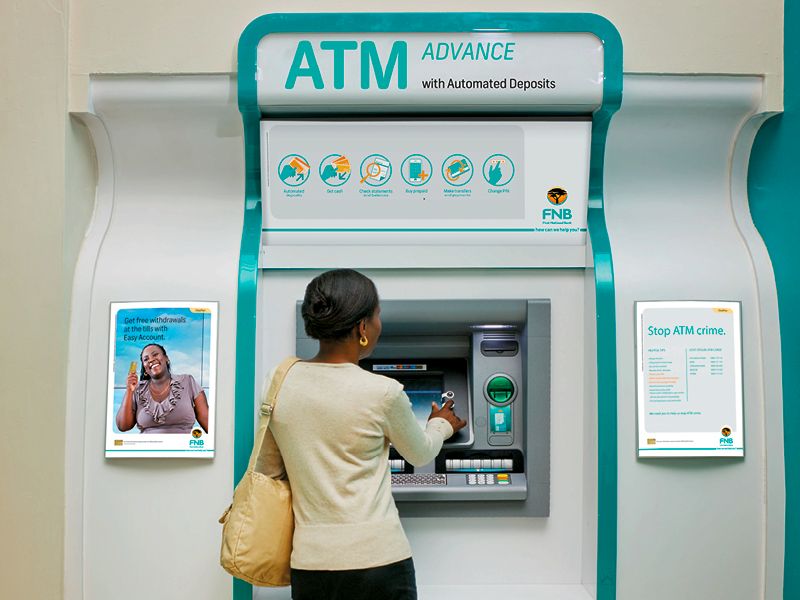As the old saying goes, don’t work harder work smarter – the same can be said of the way in which you bank. We often unknowingly transact in a way that not only frustrates us but that takes up unnecessary time and wastes money that could have been put to use to cover other expenses.
“Cancelling a card, getting bank details, making deposits and paying someone rank high on the list of banking transactions that consumers still go into a branch for,” says Eunice Sibiya, Head of FNB Consumer Education.
“It might not be an obvious expense but banking in a branch takes time in terms of travel and queuing and you are likely to pay more in bank fees.”
Thanks to technology, banks have been able to put services and solutions in place that help customers to bank easier, more effectively and that exclude having to visit a branch. There is also often more than one banking platform, such as cellphone banking, App Banking and self-service devices that all allow you to do the same transaction so that you can bank on the platform that you are most comfortable with.
One such a platform is the variety of self-service machines such as Automatic Teller Machines (ATMs), Advanced Deposit Terminals (ADTs) or touch screen Slimline ATMs. Not only is using these machines ideal for those who are still hesitant to bank on a mobile device such as a smartphone, but they generally have a larger footprint compared to branches.
“Self-service devices are strategically placed by banks in cities, suburbs and more remote areas to ensure that all banking customers can easily access a device which provides them with a full suite of banking options. You are likely to find a touch screen Slimline ATM in spaza shops in more remote areas whereas an ATM might be as close as the garage around the corner, again eliminating the need to spend money on travelling,” notes Sibiya.
Knowing what these devices offer is key to avoid driving to a branch. Below are a few bug bears associated with branch banking which can easily be avoided by making use of self-service devices.
Card cancellations
Realising that your card is lost or stolen is enough to cause the type of panic that makes you forget where you placed your card cancellation numbers. Make sure that you save this number on your phone but also familiarise yourself with the card cancellation options available to you.
“In addition to phoning a call centre, your bank could have a card cancellation option on its banking app or even more conveniently, allow you to cancel debit and cheque cards at an ATM – the perfect option in the event that your card gets swallowed by an ATM or swopped by a fraudster,” says Sibiya.
Getting hold of your bank account details
Very few people can remember their bank account details and the documentation on which these details were printed is often thrown away. This results in many customers going into a branch to get the details so that someone can pay them.
“This is time wasted as your bank might be offering a Please pay me facility on ATMs,” mentions Sibiya.
Pop by your bank’s ATM and check if it has a function that will give you your bank account details. Some banks will have a printing functionality which will print it out on a slip or the option to send an SMS with your account details to yourself or the person who has to pay you. Store the SMS so that you always have it on hand.
Depositing money
Despite of an array of electronic funds transfer options provided on different banking platforms, depositing physical cash, can unfortunately only be done at a branch or ADT.
“An ADT is always your best option for deposits as you can save up to 50% on bank fees compared to an in branch deposit. Just take note of the maximum amount that you are able to deposit at an ADT, as these devices can only accept deposits of 100 notes at a time – if your amount is more you can do more than one deposit or enter the branch for larger deposits,” advises Sibiya.
Make paying someone easier
It is no secret that carrying cash is not only more expensive but also riskier as all funds will be lost if a wallet that contains cash is stolen. This is not the case if your wallet is stolen with your cards in it because a fraudster needs you card and PIN in order to access your account.
If you are not yet comfortable to make electronic funds transfers (EFTs) from your mobile device, try doing so from an ATM or ADT. Instead of withdrawing cash and physically handing over the money, load the details of the people you want to pay once off in a branch (the details will then be saved onto your profile) and make the payment from the ATM/ADT via the payments option.
“Familiarise yourself with your bank’s self-service facilities to ensure that you get the most out of your banking services. Knowledge is power and when it comes to banking, more money and time,” concludes Sibiya.










